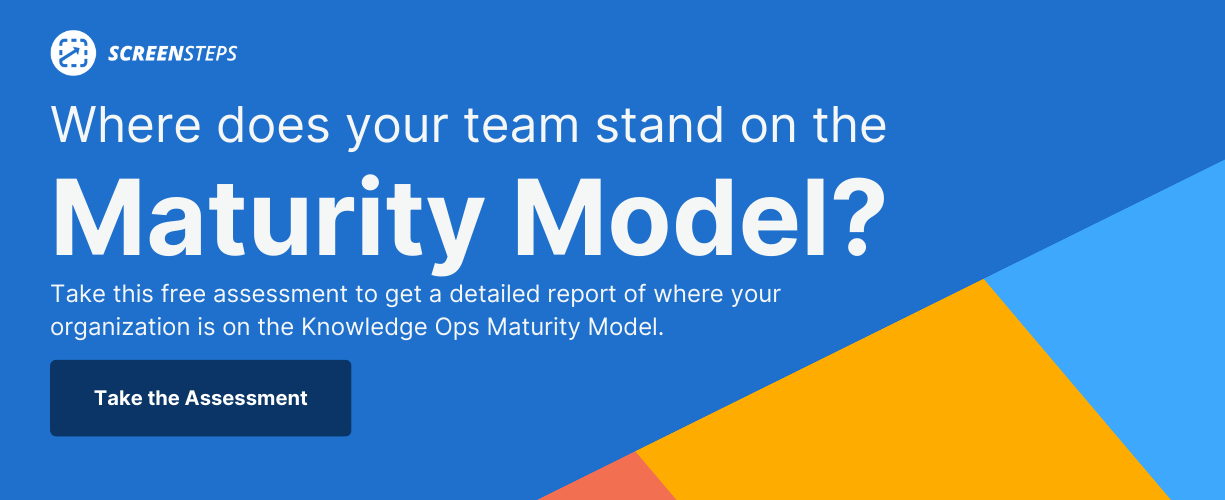How Much Does Tribal Knowledge Cost Your Company?
Tribal knowledge has a significant impact on your business’s efficiency and productivity. Tasks take longer, knowledge is easily lost, service is inconsistent, and employees are stressed and lack confidence.
But, how do all of those operations translate into company costs?
As one of the co-founders of ScreenSteps — a knowledge ops solution — we set out to solve the knowledge transfer problem. After nearly two decades in the knowledge transfer business, we’ve recognized that tribal knowledge is the root cause of most companies’ knowledge transfer problems.
At the very least, inefficient and ineffective knowledge transfer makes everything take longer, driving up costs significantly. At its worst, poor knowledge transfer causes mistakes and non-compliance, leading to unhappy clients and regulatory problems.
So, how much is tribal knowledge costing your company?
Here are four areas where tribal knowledge is costing your company more money than it needs to be. Watch the 3-minute overview and then dive into the details below.
1. Onboarding new hires
Companies that rely on tribal knowledge spend a lot more time onboarding new hires. That’s because they require employees to memorize every policy, procedure, and detail about the company.
That’s not to mention that training is a painful process for new hires. New hires are confused and stressed out. It takes a long time for new hires to feel confident in their roles (sometimes 12-18 months.)
An SHRM report found that it costs about $4,100 to onboard a new hire.
We’ve found that it takes 4-52 weeks for employees to reach proficiency, depending on the complexity of the position.
The cost of long onboarding sessions increases each day that your employees spend in training. It increases every day that an employee isn’t able to work independently on the job.
What would happen if you could reduce the onboarding time?
Reducing the amount of time it takes to train new employees as well as the time it takes new hires to reach proficiency, significantly reduces your onboarding costs.
Let’s look at an example. Let’s say you’re a call center and you are preparing to onboard a new hire class. For this scenario, we’ll say you pay your new agents $20/hour. It takes roughly 60 days to onboard new employees.
What if you were able to cut training time down to 38 days? How much money would that save you? In the table below, you can see the potential cost savings.
|
Reduction in onboarding days |
Savings per employee onboarded |
Savings when onboarding 10 employees |
Savings when onboarding |
|
22 |
$3,520 |
$35,200 |
$176,000 |
|
53 |
$8,480 |
$84,800 |
$424,000 |
|
230 |
$36,800 |
$368,000 |
$1,840,000 |
2. Employee attrition rate
Training new hires is an investment in your future productivity. But, when new hires are quitting in the middle of training or only sticking around a year, that is a sunk cost. Long training sessions lead to low morale, low confidence, and high stress.
With a high attrition rate, you end up spending more money on recruiting new employees. The hiring process typically takes anywhere from 2 to 6 weeks. Plus, you’ve lost all the money you spent on training the new hire that quit a few weeks into training.
To sum it up, the employee attrition metrics that cost your company the most are the:
- Managers and supervisors’ time spent reviewing applications and interviewing candidates
- Money spent training employees who don’t stick around past training
- Ads for recruiting
3. Compliance
Achieving compliance is almost impossible when operating with tribal knowledge. Without digital guides to reference, you rely on employees remembering to do the right steps, at the right time, every time. But that doesn’t leave room for human error.
Inevitably, employees will make mistakes. And in industries that are heavily regulated — like healthcare, financial services, etc. — there is no room for errors.
When your annual audit comes around, those mistakes can cost businesses hundreds, thousands, and even millions of dollars. Those costs come from correcting mistakes as well as paying fines for not achieving compliance.
4. Productivity
How long do tasks take in your business? When businesses rely on tribal knowledge, it often takes employees longer to complete tasks than if they were following a well-written digital guide. That’s because answers are at your employees’ fingertips.
When you leave tribal knowledge behind and switch to a more advanced knowledge transfer strategy, you:
- Decrease average task time
- Decrease escalations
- Free up your supervisors’ time (reduce questions)
- Increase employee independence
- Increase employee confidence
With the right framework and reliable digital guides, employees can do 2-3 times the amount of work in the same amount of time. That’s duplicating your workforce without needing to hire new staff.
How does this translate to money?
Since you aren’t duplicating work by using two employees to handle the task of one employee, you are saving the supervisor’s salary for the time they spend supporting other employees.
Escape tribal knowledge and save money with a more efficient knowledge transfer strategy
It’s difficult to calculate exactly how much money you could save by adopting a more advanced knowledge transfer strategy. By looking at the big picture of operations, you see that your cost savings quickly add up when employees have reliable digital guides that they can access 24/7.
With ScreenSteps, we’ve developed the Find & Follow Framework. This framework has helped companies transfer knowledge more efficiently. It has resulted in 87% faster training times, 85% training budget saved, and more.
So, exactly how much is tribal knowledge currently costing your company?
Our ScreenSteps experts can help you determine how much tribal knowledge impacts your company. Schedule a meeting with a ScreenSteps expert to discover the costs and develop a plan to escape tribal knowledge.




